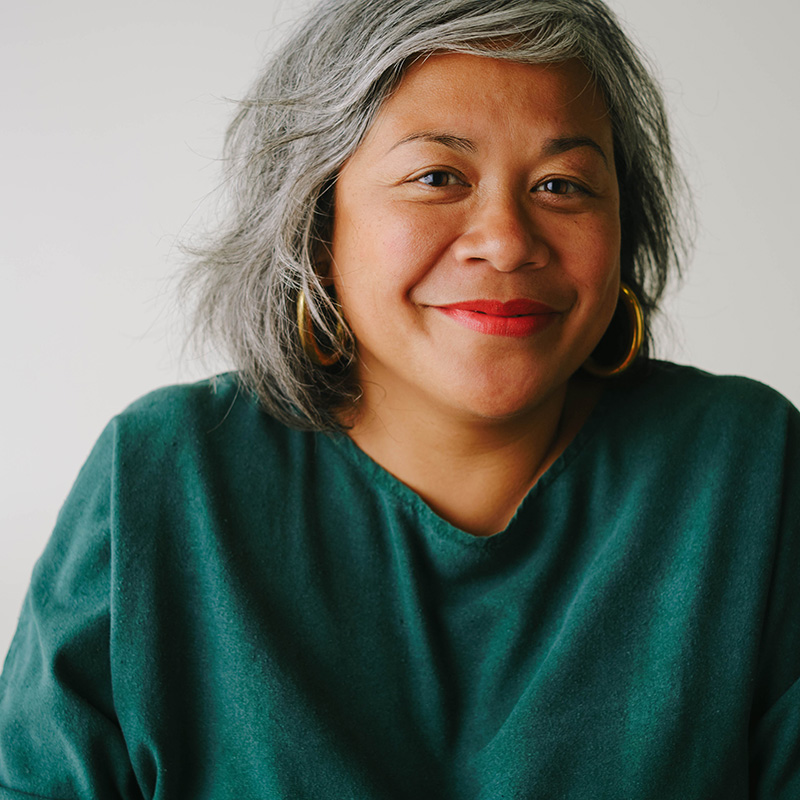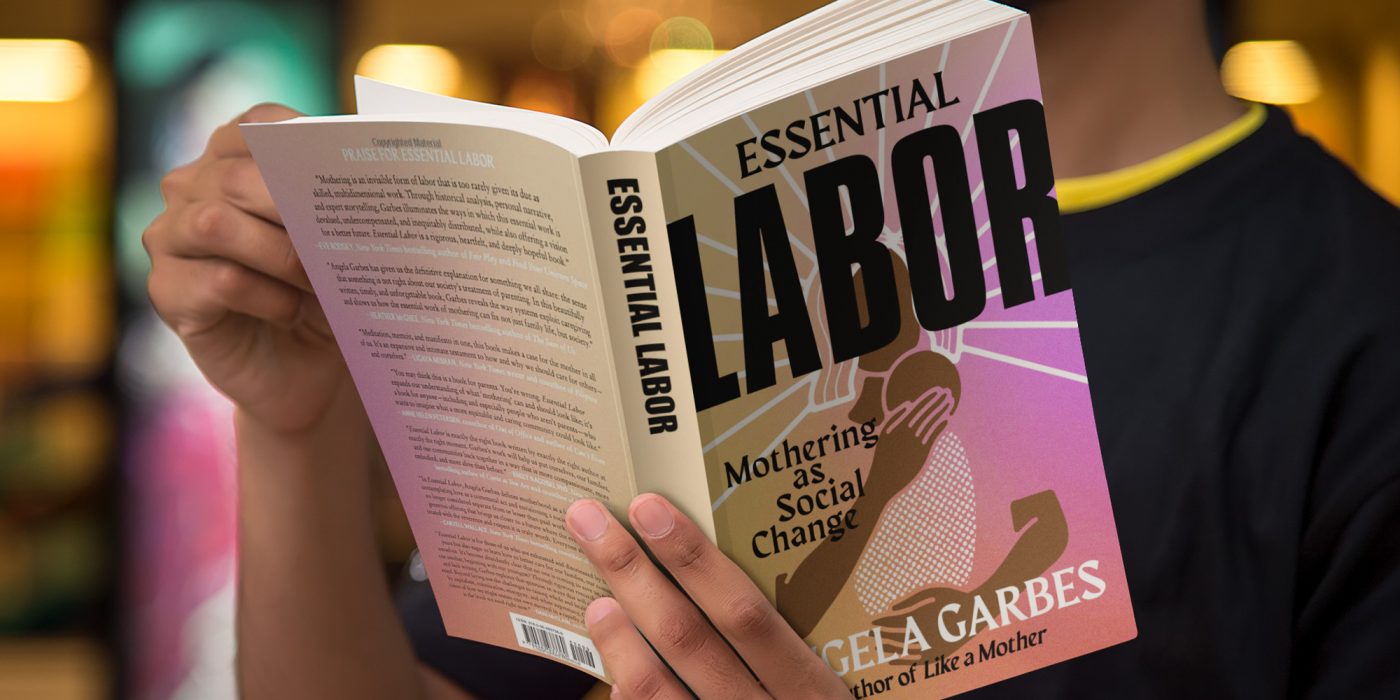Angela Garbes
Essential Labor: Mothering as Social Change
Harper Wave 2022; 208 pages
Just as I started reading Angela Garbes’ remarkable new book, Essential Labor: Mothering as Social Change, a new kitten came into my life. The kitten had a little cold, nothing serious for her, but my older cat caught it and became scarily ill (better now, thanks). For several days, I intermittently read Garbes’ book, grabbed one cat or the other to administer medicine, made sure the baby cat had baby cat food and the older cat didn’t eat it and vice versa, shoveled the litter box more than I had ever imagined I could, and tried to keep the hissing and spitting to a minimum while I encouraged them to work out their differences.
I felt as though I were right back in those days as a single mom when someone had a cold, someone had a science project, I had a deadline and how was I going to get all this mess to work? Always with the question running in the background, “Is this what my life is about?” Then, I read Garbe’s eloquent reflections on mothering as maintenance and maintenance as essential and honorable. It makes the world go round; it keeps life happening.
I don’t know that I’ve ever read a book that made me feel more seen; I wish I had had it years ago when I was up to my neck day in and day out with all that mothering.
The way Seattle author Garbes defines mothering, though, a lot of us are always up to our necks in it. She traces her understanding of mothering beginning with her first book, Like a Mother, about the science and culture of pregnancy, to her much broader view now that mothering is a verb and “the action of mothering … includes anyone who is engaged in ‘the practice of creating, nurturing, affirming, and supporting life.’” The work of raising children is mothering, she writes, and includes people of all genders, extending to nonparents—preschool teachers, babysitters, good friends who are so close with their caring that they almost become co-parents.

Garbes wrote Essential Labor during the pandemic as her daughters’ preschool, along with much of the rest of the world, locked down. As a writer, she didn’t get a regular paycheck or health insurance and her husband did, so by default it became her job to care full-time for their daughters, 2 and 5 at the time. The pandemic underscored for all of us that the essential work of caregiving is the only truly essential work humans do. During the “long, strange season” of the pandemic, people began to see—maybe for the first time—that caregiving is hard work—mentally, physically, and emotionally exhausting. It is also highly skilled labor without which nothing in the world works as it should. Yet, what recognition do those involved in this essential labor receive in reality? Beyond hollow Atta-girls and sentimental talk about the importance, yea even the sacredness of mothers, how does American society actually recognize the people do the care work, the maintenance and domestic labor that keeps the whole shebang running?
Garbes alternates her well-researched, fact-based reportage on the state of mothering and caregiving in the US with personal reflections of her upbringing as a Filipinx-American with two parents in the healthcare field, a lens that allows a particularly powerful insight into the work of caregiving in America. The Philippines has for decades served as the farm team for the US healthcare workforce, providing nurses and other healthcare workers to make up for shortages in the US workforce. As is always the case, the immigrants ended up taking or being assigned the jobs the white workers didn’t want, which for nurses often meant the ICU or critical care jobs that required them to be more intimate with patients’ bodies.
During the pandemic, Garbes writes, she read that Filipinx nurses made up 4 percent of the nursing workforce in the US and accounted for 34 percent of Covid-related nursing deaths—a gut punch, she says, because any one of those deaths could have been her mother. When she saw all of her “wild, racing thoughts and frustrations about the state of caregiving in America” showing up all over the media and in every Zoom conversation, she felt in her bones that the time had come to, as she writes, blow open the conversation, invite in new perspectives, and imagine new possibilities. As a growing body of us have realized during the past two and a half years, if we don’t fix this, our society is going to go off the rails. It’s time to double down on the radical power of mothering, she says. (And let all say, “Amen.”)
Lest it seem that Essential Labor is a scolding polemic, it is anything but. She writes deliciously about mothering as survival, mothering as valuable, sensual and even erotic labor, taking Audre Lorde’s depiction of the erotic as “the deepest life force … which moves us toward living in a fundamental way.” Love is an action verb, acts of attention. Mothering is service and attention to the body, the “geography of mothering” (lovely!), which can’t be conveyed to a child in words. If ever there were a situation that demanded deeds not words, it’s mothering.
She also writes about mothering as interdependence and underscores what so many of us have seen during the pandemic: No one gets out of this alone: Community sustains us, even if it’s limited to our Covid pod or wine shared by Zoom after the kids are asleep. To nurture our children, support our elders and our disabled, and to tend to our sick, we have to take care of each other.
Garbes shies away from nothing—ear wax, stinky toes, the incessant role of mucus, barf and other bodily fluids in caregiving. Bodies do all of that, and attention must be paid. Her frankness extends to details about some of her intimate moments with her husband which may land as TMI for some of us, but her point about the power—and necessity—of pleasure is well-taken.
She’s also not afraid to tell one on herself, relating how a friend on a camping trip showed her how to blow on the campfire to get it going. When she asked how this (white) friend learned how to do that, the friend said that as a kid her family was too poor to stay in hotels, so when they went on vacation, they always camped. In that moment, Garbes had a sudden reckoning with her own privilege, in many ways a typical, middle-class family whose parents could afford to send their children to private school and take vacations that involved staying in hotels with swimming pools.
But she writes of also seeing the way her successful, hardworking parents endured the immigrant indignities of having their competency questioned, being condescended to socially and professionally, being essential yet infantilized, oddly echoing motherhood itself. Garbes demands more for mothers, for caregivers—more acknowledgment, more information, more pleasure and compassion, more recognition that cultivating and nurturing a child’s life force and essence can be more deeply satisfying for both child and caregiver than any other life experience.
Essential Labor is both a memoir and a call to action. The caregiving crisis the US finds itself in now will outlast the pandemic and we must figure out ways to care for each other. Individual people patching together individual solutions will never work, and it’s up to all of us to take what the pandemic has taught us about essential caregiving and turn it into political will and action. It isn’t rocket science: Societies throughout the world have sorted this out and created solutions that allow caregivers to be acknowledged and caregiving to be shared. Part of mothering, Garbes writes, is to insist on worthiness. It’s time the US does that now—insist on the worth of caregiving—and in the process, build something more powerful than we’ve ever known, based on love, inclusion, mutuality, and acceptance.

K.C. Compton
K.C. Compton worked as a reporter, editor and columnist for newspapers throughout the Rocky Mountain region for 20 years before moving to the Kansas City area as an editor for Mother Earth News. She has been in Seattle since 2016, enjoying life as a freelance and contract writer and editor.



